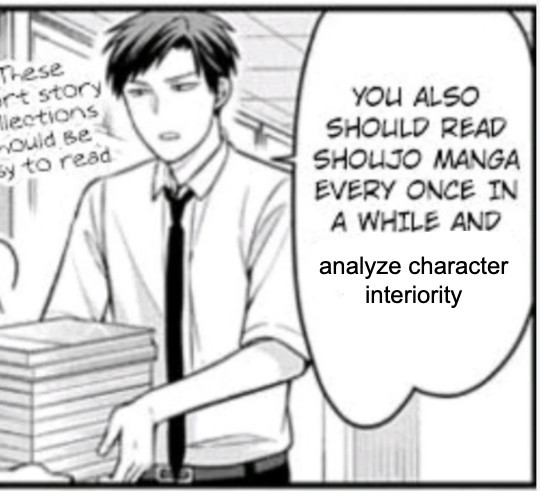#there are definitely other moments like this such as the locked room in the miharu arc
Explore tagged Tumblr posts
Text
a difference between the experience of reading the natsuyuu manga and watching the anime which is only interesting to me is that there's no distinction between special chapters and regular ones in the anime. the reason i find that interesting is that the specials are, so far in my reread, the only chapters that spend any time completely outside of natsume's POV. when we see other characters' perspectives in regular chapters, it's typically part of an extended monologue or a memory being transmitted to natsume, so we're still not really leaving his perspective. the only times we leave his POV are when he's physically not present in a scene, and in those instances we usually don't get any narration or interior monologue from the other characters.
tanuma in "a suspicious visitor" is the only exception i can think of off the top of my head, though i'm sure there are others i'll get to and just don't remember at the moment. the scene between matoba and ban at the end of the homura arc, for example, is outside of natsume's POV by necessity but is pure dialogue with no interior narration because these are not characters to whom we have that kind of access! (for more on matoba's elusive subjectivity see sp15, says tumblr user worldunbent.)
the special chapters jump all over the place; so far i've gotten to chapters from the perspectives of little fox, an unnamed youkai, nyanko, tanuma, and hinoe (although hinoe's chapter is framed as a story she's telling natsume, so it could have fit in a regular chapter). they have a separate numbering system from the regular chapters, are much shorter, and almost always come at the end of volumes*. in the anime, however, there's absolutely nothing to distinguish the episodes adapting the specials from the ones adapting regular chapters other than the POV shifts, which gives anime-only viewers a very different impression of how the series approaches character interiority. i don't think there's anything wrong with this as an adaptation move and it's pretty much necessary, but it's just notable because in a series that's all about how people see the world differently, the choice to make such a distinction between chapters in the protagonist's POV and chapters from everyone else's POV is a significant one.
the reason i'm paying so much attention to POVs in this reread in the first place is because i've been listening to the podcast media club plus and jack, who is pretty new to anime, keeps pointing out the constant perspective shifts in hunter x hunter and the other hosts are like, "yeah, that's normal." this post from another listener expands on how and why it works as a genre norm in shonen battle anime/manga specifically. so now i'm just cursed to be hyperaware of POV shifts in anime/manga, and given that the three series i'm reading/watching at the moment are hxh, dungeon meshi, and natsuyuu, natsuyuu really stands out in how rarely it leaves natsume's head in the regular chapters. i guess i need to go read some more shoujo for a larger sample size lol

*i have a chapter spreadsheet 🤓 and the exceptions to this are sp18, which is just stuck in the middle of v22, sp20, which is the second-to-last chapter of v24, and sp21, which is the first chapter of v25. i understand the placement of sp20, which is "intermission detectives" and makes sense to have as an break between regular chapters, but i'll have to figure out what sp18&21 are doing when i get to them.
#i think as i get to more plot-heavy arcs with more characters there will be some POV shifts within regular chapters#but either it hasn't happened yet in what i've reread or i haven't noticed lol#natsuyuu.txt#the conversation between ban and matoba is fun to me because it's one of those only times in a regular chapter#that the reader gets access to concrete information that natsume doesn't have#there are definitely other moments like this such as the locked room in the miharu arc#but that's more about characterization and vibes.#after 100 chapters midorikawa is finally like you can have some dramatic irony. as a treat.
36 notes
·
View notes